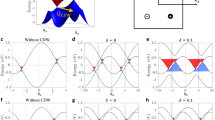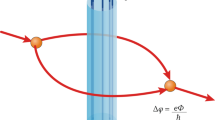Abstract
In spite of a very mixed record of success and failure, Regge theory, in which the notion of complex angular momentum is introduced into quantum mechanics still lives on. What has dissuaded physicists from discarding it, and what is our present assessment of the theory?
This is a preview of subscription content, access via your institution
Access options
Subscribe to this journal
Receive 51 print issues and online access
$199.00 per year
only $3.90 per issue
Buy this article
- Purchase on Springer Link
- Instant access to full article PDF
Prices may be subject to local taxes which are calculated during checkout
Similar content being viewed by others
References
Regge, T. Nuovo Cimento 14, 951 (1959).
Kronig, R. J. opt. Soc. Am. 12, 547 (1926).
Kramers, H. A. Atti. Congr. Intern. Fisici, Como 2, 545 (1927).
Gracomelli, G. Phys. Rep. 23 c, no. 2 (1976).
Baker, W. F. et al. Phys. Lett. 38 B, 342 (1974).
Joynson, D., Leader, E., Lopez, C. & Nicolescu, B. Nuovo Cimento 30 A, 345 (1975).
Meuller, A. H. Phys. Rev. D 2, 2963 (1970).
Author information
Authors and Affiliations
Rights and permissions
About this article
Cite this article
Leader, E. Why has Regge pole theory survived?. Nature 271, 213–216 (1978). https://doi.org/10.1038/271213a0
Published:
Issue Date:
DOI: https://doi.org/10.1038/271213a0
Comments
By submitting a comment you agree to abide by our Terms and Community Guidelines. If you find something abusive or that does not comply with our terms or guidelines please flag it as inappropriate.



